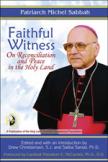A Daring Vision
Michel Sabbah served as the Latin Patriarch of Jerusalem from 1988 to 2008. The title of this ion of his pastoral letters, sermons and addresses underscores that these writings are deeply grounded in Sabbah's commitment to the Gospel. He also provides reliable testimony about events in the Middle East for the past two decades. The subtitle indicates the principal goal of the patriarch's labors: "reconciliation and peace in the Holy Land.”
Patriarch Sabbah writes for a broad Christian audience. He encourages pilgrimage to the Holy Land, not just to see the holy sites, but also to encounter the "living stones”: our brothers and sisters in the faith who live under military occupation, just as Jesus did in the first century. These Christians-a dwindling community-do not enjoy the basic human right to free exercise of their religious convictions, including free access to the holy sites. Because of the belligerent Israeli occupation of the West Bank, Christians in Jerusalem are regularly impeded from going to Bethlehem for Christmas. Nor may Bethlehemites go to Jerusalem for Holy Week and Easter or Pentecost.
The author also writes of his engagement in interreligious dialogue with Jews and Muslims, and encourages Christians all over the world to do likewise. His concerns, moreover, are not just theological, but also those of practical daily life. He describes with blunt clarity the "economic and social strangulation” of Palestinian Christians and Muslims: "collective punishment general siege on towns and villages demolition of access roads hundreds of military checkpoints curfews impeding all movements inside the town assassination of Palestinian leaders and activists shelling and demolishing of houses and agricultural structures.” But he is not a partisan advocate of victory of one side over the other. On the contrary, he rejects as immoral all uses for terrorist military power, whether from F-16s and Apache helicopters in Gaza, or from Palestinian rockets aimed at civilians in Siderot and Eshkalon.
The patriarch addresses all the children of Abraham when he vigorously repudiates the misuse of religion by Jews, Christians or Muslims to justify their acts of violence: 'holy war’ is a contradiction in terms. God cannot and does not want to oppress anyone, individuals or peoples, nor can God command that. His love for one people cannot become oppression for another people. Therefore, no one today has the right to invoke the name of this God who is just, kind, and who loves humankind, to justify one's own human violence, whatever the supposed interest or good, of religion or of the nation.”
Faithful Witness bears an important message for all-whether religious believers or not-who care about the morality and legality of the use of force in general, or who yearn for a nonviolent, negotiated resolution of the Israeli-Palestinian conflict in particular.
Though penned over the course of two decades, Sabbah's writings remain relevant to the present moment for distinct, yet related reasons. Two current realities are the source, respectively, of profound sadness and deep hope. Sadness is prompted by the atrocity of the most recent violence in Gaza, which has claimed over 1,300 Palestinians and 13 Israelis dead, thousands injured, massive homelessness in a zone densely populated by refugees of prior wars, and severe damage to the infrastructure in a territory long under siege and in grave humanitarian crisis. If anyone heeds the message of Sabbah, none of this devastation was necessary or justifiable.
There is hope because of the dawn of a new day in American foreign policy. President Barack Obama recently named Senator George Mitchell as his special envoy to the Middle East. Mitchell's experience in negotiating an end to violence in Northern Ireland makes him well suited to achieve a similar breakthrough where half-hearted or misguided efforts have failed in the past. He believes, as Patriarch Sabbah does, that there is no military solution to the Israeli-Palestinian conflict, and that "there is no such thing as a conflict that cannot be resolved.”
Sabbah expressly cautions against confusing hope with reliance on military power. "Military victories by themselves do not bring about security. Only peace, built on justice and the respect of human rights, can bring about security.
This article also appeared in print, under the headline “A Daring Vision,” in the May 18, 2009, issue.








